Words By Pamela Denholm. Photos By Sarah Bennett.
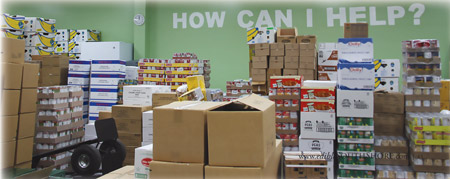
The Weymouth Food Pantry proudly displays its mission for all to see.
We endured the pandemic together. We all went through the same thing, yet each of our experiences is unique, different colors fractured from a single beam of light through a prism. Did you stay home? Work? Were you worried for your loved ones? Did somebody you care about end up in a hospital? A collective experience of a singular, global event from a gazillion viewpoints layered on top of each other, like mirror balls inside of mirror balls.
My experience was as a mother, daughter, wife, sister, aunt, and the Executive Director of Weymouth Food Pantry. At the pantry we were classified as “essential” when the grocery store shelves were empty and the lines at the food pantry were long but downgraded to “not even all that important” when it came time to get in line for the vaccine. It’s okay though, our official standing never really held any weight anyway.
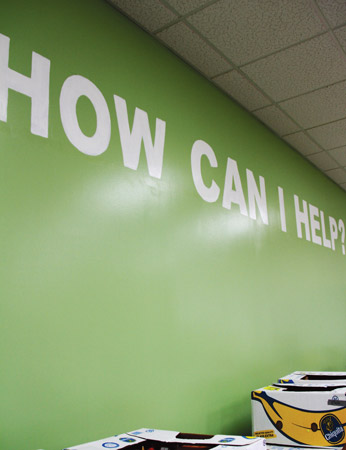
One morning, at the height of the food shortage, I answered the phone at work. It rang constantly. What happened next will remain one of my most vivid memories of COVID. An elderly lady was on the other end of the line. We had been visiting her regularly with groceries for a number of years. She lived alone, struggled to make ends meet, and didn’t get out much even before the pandemic because of her age. “Pamela, listen dear.” Her voice was soft, and I strained to hear her. “I can’t bear what I see on the news. I’ve lived a good life, promise me something, will you promise me?” I promised her. “If you run out of food and a family with young children needs help, will you give them my food? Will you do that for me, dearie? Promise me.” I started to cry.
That wouldn’t be the only time. The hardest thing about working at a food pantry over the past 18 months was not the volume of the work, it was the level of anxiety surrounding the work. The people who came to us for help, our volunteers, staff—none of us knew how long this would last, who would get sick, or what things would look like on the other side. Everybody was on edge and the constant barrage from our leaders who couldn’t agree on anything didn’t help.
I met a single mom of three children, one of whom was special needs and high risk. She called in one day to ask how to use the food pantry. She worked three jobs to provide for her family: she worked at a hairdresser, the grocery store, and as a server at a restaurant. With the stay-home order, she lost two of those jobs, and whilst she picked up as many shifts as she could at the grocery store, she was terrified of bringing COVID home to her children. She broke down on the phone and cried and cried. “Why doesn’t she just stay home?” asked one of our volunteers, more out of concern than judgment—but how could she? She wasn’t making rent, and although there was an eviction moratorium, that just meant they couldn’t evict her and her children if she didn’t pay rent, it didn’t mean that rent wasn’t due. A stimulus check helped relieve some of the pressure for her, but it wasn’t going to cover her rent for the next nine months, and as soon as that moratorium was lifted, she would owe back rent. With each passing day, the hole she was in was getting bigger. She had worked so hard, and these circumstances so out of her control were financially devastating. It will take her years to recover.
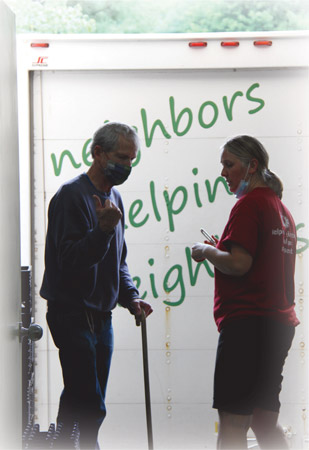
Neighbors Help Neighbors at Weymouth Food Pantry.
For me, seeing how this impacted people in our community was the worst part of the pandemic. It was raw and real. Our teachers in town were also feeling it, trying to pivot and teach remotely, a real-time experiment in a giant melting pot of experiments. I have four teachers in my family, and one of the things I have heard them speak of over the years is how difficult it is to remember your role in the classroom when you come across a child who is suffering because, among other things, there is domestic violence at home, there isn’t enough food to eat, or they have lost a loved one through death or separation—sounds like a COVID trifecta, doesn’t it? And we would be naive to think our children didn’t feel our anxiety.
We were all concerned for the children who used to rely on the free and reduced lunches at school to have their needs met. That’s how our weekend backpack program initially started—a teacher approached us looking for help to meet the needs of children in her classroom who had breakfast and lunch Monday to Friday but were experiencing hunger on the weekends. Together, we put together a backpack of healthy snacks, breakfast items, easy-to-prepare entrees, and fruit to go home with the children every Friday. Now, the children were home seven days a week and that same teacher, Marisa Matta and her colleague Kathleen Lyon, wanted to know how they could help. We put together larger bags with more food and made sure they were available at a free-lunch drive-thru for any family who needed it. Many of the teachers used their own vehicles to deliver bags for kids who couldn’t get to the drive-thru.
With all the extra activity and attention food pantries received, we also received some questions. People were genuinely curious about how this all works. How do you know people who come to you for help actually need the food? Do you do a financial check? We get asked that a lot. Not because anybody is judging anybody, but because people want to make sure we are not being frivolous with their donations. The answer is no. We don’t do a financial check. First, I’m not qualified to audit somebody, and second, everybody’s circumstances are different. That’s why SNAP as a “one size fits all” program is such a challenge.
Take one young family who we see from time to time. Dad works, mom is at home with the children. If she were to work, almost her entire earnings would go to childcare, so until the children are in school, it makes sense for her to stay home. They clip coupons and do their best to get by, a situation not eased in any way by the cost of housing in the area. They have no savings, they are stretched too thin, and the slightest upset—which might be a mere inconvenience for some, like a flat tire—disrupts the delicate dance and it can take them weeks to recover while they juggle, pay this and not that, and take hits on their credit score. Because her husband works a lot of overtime to help cover bills, they don’t qualify for SNAP benefits. They miss it by 11 cents a month. Were we to have these kinds of criteria, we would have to turn this family away, and nobody wants that. It’s food.
In the years I’ve worked here, I don’t think I’ve ever seen anybody come to the food pantry just because it is free. If there are people who do that, they are in such a minority that we would never want to risk turning anybody away who might actually need help. Besides, asking for help is hard. By the time people come to us, they have already been through the wringer. Imagine meeting people for the first time when you are likely feeling your worst, you are in a terrible situation, and you are there to ask for help. It takes a lot of courage.
We sometimes also get raised eyebrows when a person pulls in driving a nice car. We don’t know what the circumstances are, though. I met a woman once who lost her husband to illness and was buried under medical expenses. She had sold their family home and many of their other assets and was still underwater, but she couldn’t bring herself to sell his car because it still smelled of him. She drove it everywhere, including to the food pantry. Another family borrow a parent’s car once a week to run all their errands and get their food pantry visit in because they haven’t paid the insurance on their own car—they can’t afford to. How they get to us is not as important as that they get to us.
Since COVID began, we have distributed over a million pounds of food and never had to turn anybody away. We were overwhelmed by the support of our community, and we were creative. We never missed a service day, and never had to close the pantry to quarantine from exposure. We split up to work on small, stable teams with no crossover, we were careful, and we were lucky. We worked hard. We didn’t learn to bake bread, or to speak a new language, we didn’t feel isolated, we were engaged, we had purpose, and even though it was a contentious election year, we saw the best in people. We were very lucky.
Weymouth Food Pantry
P.O. Box 89009
Weymouth, MA 02189
(781) 331-7682
www.WeymouthFoodPantry.org
Pam Denholm is a community (ec)centric human who believes local people are the reason why we love local food. One of her favorite South African words is Ubuntu. Translated, it’s to act with kindness and humanity in ways that benefit a community. It means “I am because you are.” I am hungry, because you are hungry.

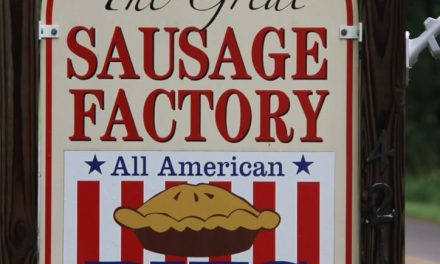


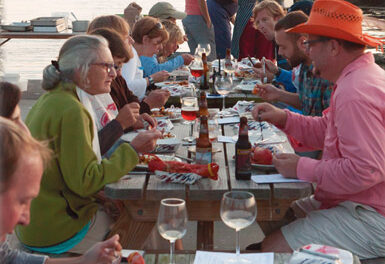
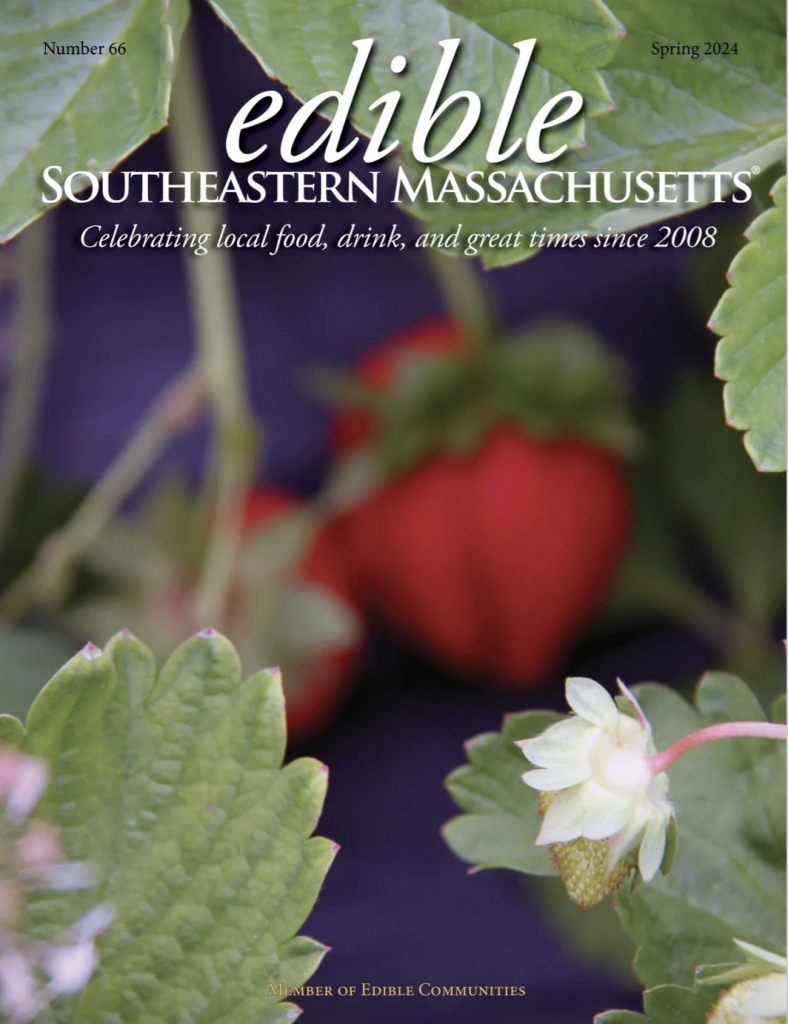

See Pam’s lastest achievement in helping feed our local community here: https://www.bostonglobe.com/2021/10/22/metro/weymouth-food-pantry-start-food-bank-serving-south-shore/
Great article Pam!
We are fortunate to have Pam as a part of our community. Her innovation, determination and commitment have made the Food Pantry what it is, an integral support for our town. During the Covid chaos the Pantry has continued to grow and evolve. It would have been easy to take a tread water approach, but with Pam there is no time for standing around or hand wringing. Thank you for everything you have done for Weymouth and the surrounding communities
We are fortunate to have Pam as a part of our community. Her innovation, drive and commitment are what has made the Food Pantry what it is today, an integral part of our town. In spite of the Covid chaos the Pantry has continued to grow and evolve. There is no standing around or time for hand wringing with Pam. Thank you for everything you have done